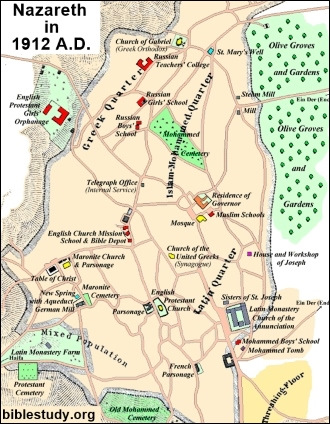Jesus, after moving to Capernaum, is recorded to have visited Nazareth twice during his ministry. He visited his hometown, where his mother and half-siblings still lived, during Pentecost in 27 A.D. and in the early part of 29 A.D. During his second visit the Bible reveals an amazing fact concerning the lack of miracles experienced by those who knew Jesus all of his life.
"And He was not able to do any works of power there (Nazareth), except that He laid His hands on a few sick people and healed them" (Mark 6:5, HBFV throughout).
We need to look a little deeper into Christ's two Nazareth visits to discover why Christ couldn't display the fullness of his glory through miracles.
Going Back Home
While visiting the city's only synagogue Jesus reads Isaiah's "jubilee year" prophecy which predicted God's anointed would preach the gospel and free those in bondage (Luke 4:17 - 19). Then, to the surprise of the crowd, he reveals this 700+ year old prophetic announcement points to his ministry and that they are the first to witness its fulfillment (verse 21)!

Those in the synagogue, who marvel at what Jesus says, nevertheless find it hard to believe someone they've known for years as the son of Joseph (Luke 4:22) could be a prophet (let alone the Messiah). The crowd's refusal to accept his miraculous acts in other places as proof of his unique mission (Matthew 13:54, Mark 6:2, Luke 4:23), along with their faithless desire that their acceptance was predicated on great signs performed in Nazareth, earned them a rebuke (Luke 4:23 - 27).
Jesus' response so angers those in the synagogue that they form a mob and attempt to murder him by pushing him off a nearby cliff (Luke 4:28 - 29)! Unsurprisingly, the Bible does not record him performing a single miracle during this visit!
A Second Rejection
Jesus revisits his hometown of Nazareth roughly a year and a half after his first visit (Matthew 13:54 - 58, Mark 6:1 - 6). Those in the synagogue find themselves surprised and confused at what they hear.
"From where did this Man get these things? And what is this wisdom that has been given to Him, that by His hands many miracles are done also? Is this not the carpenter, the Son of Mary . . . ?" (Mark 6:2 - 3).
The Bible then states those in the synagogue "were offended in Him" (Matthew 13:57, Mark 6:3). What an amazing statement! What in the world did they have against Christ?
Although they admitted Jesus taught the truth and performed countless miracles, they also knew that for many years he was a lowly carpenter who never received any formal religious training. Their inability to reconcile these facts, coupled with their lack of faith (Mark 6:6), led to rejecting him entirely.
After Jesus acknowledged, yet again, the rejection of those in Nazareth (Mark 6:4), he healed only a few folks (likely a few poor folks who didn't attend synagogue) then left. Their hard-hearted refusal to believe in him, in spite of his miracle-filled ministry that was two and one-half years old, legitimately amazed the Lord (Mark 6:6)!
Conclusion
Familiarity does not automatically lead to contempt. Our human nature, however, is prone to minimizing the plethora of positive facts we possess about someone and maximizing our negative biases in order to justify mistreating them.
Instead of accepting Jesus' words and works at face value, the faithless Nazareth synagogue members minimized the evidence that he was the Messiah. Their biases against those they deemed were not "professionally" trained and those whom they thought slighted them also skewed their judgment. Their vanity refused to entertain the possibility that someone they knew well, who was like them, could rise to be more successful than they were.
Jesus knew that any outpouring of miracles on those in Nazareth who not only lacked faith, but also justified resentment and anger toward him, would have been spiritually wasted.
Bonus Facts!
Jesus' first visit to Nazareth was the only recorded time he read an Old Testament scroll aloud while visiting a synagogue.
The Bible does not record any of Jesus' disciples being with him when he first preached in Nazareth. This partly explains why the crowd felt embolden to attempt to kill him since there would be no one to potentially defend him. During his second visit, however, his twelve disciples (and likely others) were with him (see Mark 6:1, Luke 8:1 - 2).
How angry were those in Nazareth during Jesus' first visit? They were willing to kill him even though Jewish tradition taught it was wrong to carry out capital punishment on the Sabbath (which included God's Holy Days, John 19:31)! It was also illegal for the people, who were under Roman law, to carry out the death penalty on their own authority.
Like Jesus in Nazareth, the prophet Jeremiah was also rejected by those who lived in his hometown of Anathoth. It was indeed a miracle that Jeremiah survived the many death threats against him by his neighbors (Jeremiah 1:1, 11:18 - 23).